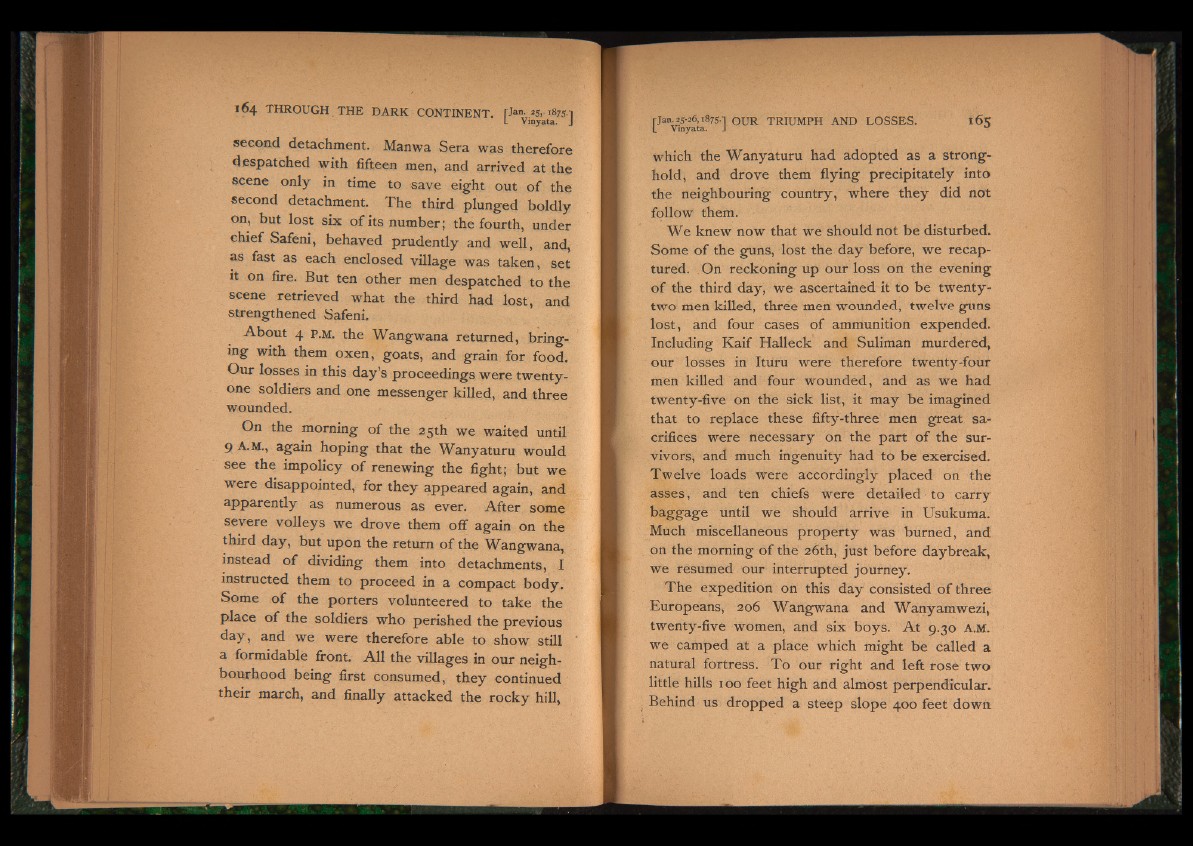
second detachment. Manwa Sera was therefore
despatched with fifteen men, and arrived at the
scene only in time to save eight out o f the
second detachment. The third plunged boldly
on, but lost s ix o f its number; the fourth, under
chief Safeni, behaved prudently and well, and,
as fast as each enclosed village was taken, set
it on fire. But ten other men despatched to the
scene retrieved what the third had lost, and
strengthened Safeni.
Ab out 4 P.M. the Wangwana returned, bringing
with them oxen, goats, and grain for food.
Our losses in this d ay’s proceedings were twenty-
one soldiers and one messenger killed, and three
wounded.
On the morning o f the 25th we waited until
9 A. M., again hoping that the Wanyaturu would
see the impolicy o f renewing the fight; but we
were disappointed, for they appeared again, and
apparently as numerous as ever. After some
severe vo lley s we drove them o ff again on the
third day, but upon the return o f the Wangwana,
instead o f dividing them into detachments, I
instructed them to proceed in a compact b od y .
Some o f the porters volunteered to take the
place o f the soldiers who perished the previous
day, and we were therefore able to show still
a formidable front. A ll the villages in our neighbourhood
being first consumed, they continued
their march, and finally attacked the ro c k y hill,
rjan. 25-26,1875.-1 OUR TRIUMPH AND LOSSES. 1 6 5
L Vmyata. J
which the Wanyaturu had adopted as a stronghold,
and drove them flying precipitately into
the neighbouring country, where th ey did not
follow them.
W e knew now that we should not be disturbed.
Some o f the guns, lost the day before, we recaptured.
On reckoning up our loss on the evening
o f the third day, we ascertained it to be twenty-
two men killed, three men wounded, twelve guns
lost, and four cases o f ammunition expended.
Including K a if Halleck and Suliman murdered,
our losses in Ituru were therefore twenty-four
men killed and four wounded, and as we had
twenty-five on the sick list, it may be imagined
that to replace these fifty-three men great sacrifices
were necessary on the part o f the survivors,
and much ingenuity had to be exercised.
Twelve loads were accordingly placed on the
asses, and ten chiefs were detailed to carry
b aggage until we should arrive in Usukuma.
Much miscellaneous prop e rty was burned, and
on the morning o f the 26th, just before daybreak,
we resumed our interrupted journey.
T he expedition on this d ay consisted o f three
Europeans, 206 Wangwana and Wanyamwezi,
twenty-five women, and six boys. A t 9.30 A.M.
we camped at a place which might be called a
natural fortress. T o our right and left rose two
little hills 100 feet high and almost perpendicular.
; Behind us dropped a steep slope 400 feet down.